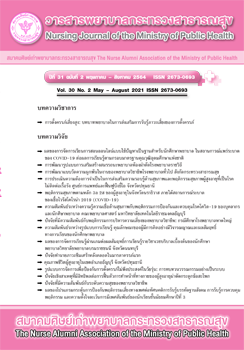Factors associated with Happiness among Registered Nurses
Main Article Content
Abstract
This study is a cross-sectional descriptive study which aims to study the factors related to the happiness towards working of registered nurses using secondary data collected by the happiness self-assessment questionnaire (Happinometer) from November 1, 2018 - January 31, 2019, then analyzed by using binary logistic regression analysis to find factors that were related to the happiness of nurses. The results showed that the sample group had an overall score of happiness level at 60.21 points which was classified as happy. According to the dimension of happiness, the sample group had the lowest score in the relaxation dimension (50.47 points), and the highest score was in the spiritual dimension (69.07 points). After testing the hypothesis, it was found that shift work was a statistically significant factor related to the happiness of nurses (OR 4.22, p=.02). The Pearson product-moment correlation coefficient was used to determine the correlation between final happiness score calculated from nine dimensions and overall happiness score rated by themselves. The questionnaire responses showed a statistically significant moderate relationship (r=.65), reflecting consistency of questionnaire responses. Shift work was identified as a factor that was significantly related to happiness level. The results of this research can serve as supporting data for executives in developing policy and modifying management to enhance happiness level among their nurses. Certainly, organizations with happy personnel can operate with stability and efficiency.
Article Details
บทความและรายงานวิจัยในวารสารพยาบาลกระทรวงสาธารณสุข เป็นความคิดเห็นของ ผู้เขียน มิใช่ของคณะผู้จัดทำ และมิใช่ความรับผิดชอบของสมาคมศิษย์เก่าพยาบาลกระทรวงสาธารณสุข ซึ่งสามารถนำไปอ้างอิงได้
References
2. Sathira-Angkura T. Strategic national plan for 20 years of public health in moving forward to nursing practice. Journal of Nursing Division 2018;43(1):1-8.(in Thai).
3. Charupronprasit R, Suthiart A, Sirirat B, Dumrongchat M. Statistical Thailand 2016. Nontaburi: Bureau of Policy and Strategy;2016.(in Thai).
4. Srisuphan W, Sawaengdee K. Recommended policy-based solutions to shortage of registered nurses in Thailand. Thai J Nurs Res.2012;27(1):5-12.(in Thai).
5. Mami S, Mehdian K, Davoodian Z. Investigation of depression rate in nurses working at state hospital of the city of and its associated factors. J Ilam Uni Med Sci.2014;22 Suppl 1:S51-6.
6. Chirawatkul S, Songwathan P, Rungreangkulkij S, Fongkhew W, Deoisres W, Sindhu S, et al. Happiness and professional attachment amongst Thai registered nurses. Pac Rim Int J Nurs Res Thail.2012;27(4):26-42.(in Thai).
7. Khaoprai T. Happiness at work of professional nurses at Nakhon Sawan provincial public health office. [Dissertation]. Nakhon Sawan Rajabhat University;2017.(in Thai).
8. Jirasrattasiri A, Ammawat K. Factors relating to the happiness level in Pakkret hospital personnel. Journal of Preventive Medicine Association of Thailand.2014;4(2):118-24.(in Thai).
9. Geiger BB, MacKerron G. Can alcohol make you happy? A subjective wellbeing approach. Social Science & Medicine.2016;156:184-91.
10. Chokthananukoon B, Dhirathiti NS. Happiness in workplace and organizational engagement factors, affecting to satisfaction of services among difference university staff generations. Panyapiwat Journal.2017;9(1):83-95.(in Thai).
11. Katsaiti MS. Obesity and happiness. Appl Econ.2012;44(31):4101-14.
12. Ul-Haq Z, Mackay DF, Martin D, Smith DJ, Gill JM, Nicholl BI, Cullen B, Evans J, Roberts B, Deary IJ, Gallacher J. Heaviness, health and happiness: a cross-sectional study of 163066 UK Biobank participants. J Epidemiol Community Health.2014 Apr 1;68(4):340-8.
13. Boonyachotima R, Pompol W, Pojanasit S, Thongnat O, Borrisut S. The happiness exploration of staffs in trauma an emergency nursing department, Phramongkutklao hospital. Journal of The Royal Thai Army Nurses.2014;15(2):252-60.(in Thai).
14. Moradi S, Farahnaki Z, Akbarzadeh A, Gharagozlou F, Pournajaf A, Abbasi AM, et al. Relationship between shift work and Job satisfaction among nurses: a Cross-sectional study. International Journal of Hospital Research.2014;3(2):63-8.
15. Chonburi hospital. Chonburi: Vision and mission [internet]. 2019 [cited 2020 Jan 15]. Available from:
http://www.cbh.moph.go.th/cbhweb2/about_history.php.(in Thai).
16. Institute for Population and Social Research. Happinometer for Ministry of Public Health’ s personnel [internet]. 2018 [cited 2020 Jan 15]. Available from: https://www.cphos.go.th/chumphaehospital/ attachments/article/647/%E0%B9%81%E0%B8%9A%E0%B8%9A%E0%B8%9B%E0%B8%A3%
E0%B8%B0%E0%B9%80%E0%B8%A1%E0%B8%B4%E0%B8%99-Happinometer%20survey%202562.pdf.(in Thai).
17. Kittisuksathit S, Tangchontip K, Jaratsist S, Saiprasert C, Boonyateerana P, Aree W. Happinometer. Nakorn Pathom: Institute for Population and Social Research;2012.(in Thai).
18. Department of Disease Control. Guidelines for analysis of organizational health, and personnel happiness [Internet]. 2017 [cited 2020 Jan 15]. Available from: http://person.ddc.moph.go.th/person1/images/
Happinometer/HPIHappinometerEngagement.pdf.(in Thai).
19. Health Workforce Reporting System, Ministry of Public Health. Happy MOPH [Internet]. 2019 [cited 2020 Jan 15]. Available from: https://hrold.moph.go.th/site/hr_moph/?page_id=37303.(in Thai).
20. Kittisuksathit S, Tangchontip K, Holumyong C, Tangchontip C, Chokthananukoon B, Jaruruengpaisan W, et al. Happiness watch report year II: January–June 2013. Nakorn Pathom: Institute for Population and Social Research;2014.(in Thai).
21. Khaoprai T. Happiness at work of professional nurses at Nakhon Sawan provincial public health office [dissertation]. Nakhon Sawan: Nakhon Sawan Rajabhat University;2017.(in Thai).
22. Nantsupawat R, Wichaikhum O, Nantsupawat A. The relationship between nurses’ extended work hours and patient, nurse, and organizational outcomes in general hospital. Nursing Journal.2014;41(4):58-69.(in Thai).
23. Bumrungsoontorn P. Factors associated with happiness level in health personnel of contracting unit for primary care in Wangchan district, Rayong province. Journal of Health Research and Development Nakhon Ratchasima Public Health Provincial Office.2018;4(1):22-35.(in Thai).
24. Tunyateerapong P, Jindarak P. A study of activities with happiness in the organization and generation that affect happiness within work. WMS Journal of Management.2019;8(2):59-71.(in Thai).
25. Muangyan M, Asawaruangpipop P. Factors affecting happiness at work of supporting staffs of King Mongkut’s Institute of Technology, Ladkrabang. Srinakharinwirot Business Journal.2018;9(2):92-105.(in Thai).
26. Chanaken W. The factors influencing work retention of generation Y professional nurses at a tertiary level hospital in the department of medical service under the Ministry of Public Health. [dissertation]. Nakorn Pathom: Christian University of Thailand;2016.(in Thai).
27. Ferri P, Guadi M, Marcheselli L, Balduzzi S, Magnani D, Di Lorenzo R. The impact of shift work on the psychological and physical health of nurses in a general hospital: a comparison between rotating night shifts and day shifts. Risk management and healthcare policy.2016;9:203-11.

